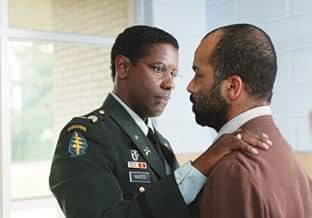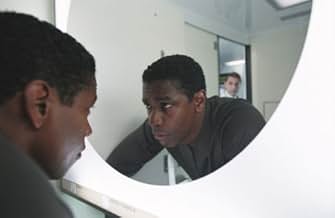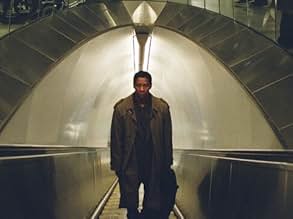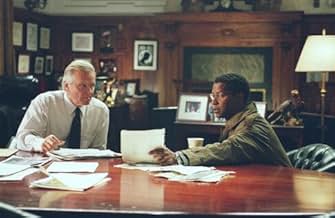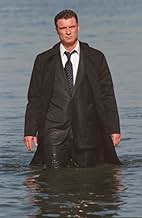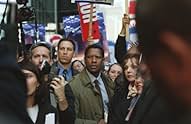Während des Golfkriegs werden Soldaten entführt und für finstere Zwecke einer Gehirnwäsche unterzogen.Während des Golfkriegs werden Soldaten entführt und für finstere Zwecke einer Gehirnwäsche unterzogen.Während des Golfkriegs werden Soldaten entführt und für finstere Zwecke einer Gehirnwäsche unterzogen.
- Nominiert für 1 BAFTA Award
- 1 Gewinn & 12 Nominierungen insgesamt
Joe Alessi
- Boy Scout #2
- (as Joseph Alessi)
Raymond Anthony Thomas
- Scout Dad
- (as Ray Anthony Thomas)
Empfohlene Bewertungen
The 1962 version of "The Manchurian Candidate" - starring Frank Sinatra and Lawrence Harvey - caught the conspiratorial mood of the time when so many Americans saw a commie round every corner. The current 'war of terror' might have seemed like an apposite time to attempt a remake. I've been a fan of Denzel Washington since he played Steve Biko in "Cry, Freedom" and I regard Meryl Street as the finest actress of her generation, so the chance to see the two starring together for the first time was an attractive one. Since I'm a political animal, the vehicle of a political thriller appeared to add to the attraction. But Jonathan Demme's remake of John Frankenheimer's classic, although it has a certain style, is overall a real disappointment. Frankly it is lackluster when it is not simply silly.
Streep gives a bravado performance as the manipulative mother of the Vice-Presidential candidate who is under external control and Washington is always watchable, but Liev Schreiber as the brain-drilled war hero and politician is robotic even when he is not 'activated'. The 'up-dating' of the story to make corporations rather than Communists the enemy is a well-worn theme, ranging from the Peter Sellers' movie "Being There" to the more recent television series "24". What this new version of Richard Condon's 1959 novel tells us is that Americans are no less fearful and paranoid than they were in the Cold War and Hollywood is no better at remakes than it ever was.
Streep gives a bravado performance as the manipulative mother of the Vice-Presidential candidate who is under external control and Washington is always watchable, but Liev Schreiber as the brain-drilled war hero and politician is robotic even when he is not 'activated'. The 'up-dating' of the story to make corporations rather than Communists the enemy is a well-worn theme, ranging from the Peter Sellers' movie "Being There" to the more recent television series "24". What this new version of Richard Condon's 1959 novel tells us is that Americans are no less fearful and paranoid than they were in the Cold War and Hollywood is no better at remakes than it ever was.
Three months ago I watched the original Manchurian Candidate on DVD. I was amazed on how good this movie is, and how well it holds up after 42 years of its release in movie theaters.
So, yesterday when I watched the 2004 version directed by Jonathan Demme it was impossible for me not to compare the two films.
Without the existence of the original, Demme's effort could be defined as a good (not outstanding) political thriller and it's easy to think that this definition is compatible with the general opinion of today's audiences.
But (a big but) in reality there is an original, and it is so good, so brave, and so well written that this new version almost feels pointless.
In adapting the story to modern day Jonathan Demme made more wrong choices than good ones diminishing the power and intensity of the original.
This remake took out some key dramatic elements that work marvelously in the original film inserting some new and poorly written plot twists changing and damaging the dramatic resolution.
This version is inferior in almost every level (the only exception is the acting). It is less powerful, less edgy, and less intelligent.
Fortunately for Demme the original picture is not as well known as classics like 'Casablanca' and this will allow his film to find a moderate positive acceptance.
So, yesterday when I watched the 2004 version directed by Jonathan Demme it was impossible for me not to compare the two films.
Without the existence of the original, Demme's effort could be defined as a good (not outstanding) political thriller and it's easy to think that this definition is compatible with the general opinion of today's audiences.
But (a big but) in reality there is an original, and it is so good, so brave, and so well written that this new version almost feels pointless.
In adapting the story to modern day Jonathan Demme made more wrong choices than good ones diminishing the power and intensity of the original.
This remake took out some key dramatic elements that work marvelously in the original film inserting some new and poorly written plot twists changing and damaging the dramatic resolution.
This version is inferior in almost every level (the only exception is the acting). It is less powerful, less edgy, and less intelligent.
Fortunately for Demme the original picture is not as well known as classics like 'Casablanca' and this will allow his film to find a moderate positive acceptance.
I have to admit, I was horrified to see that someone was remaking the 1964 near-masterpiece. I had no intention of seeing it, but then I happened to catch Demme and Washington on "Charlie Rose", and Demme put my mind to rest that he was not trying to remake the original picture. I was still skeptic, but I decided to have an open mind and check it out for myself. I'm glad I did.
The only thing this film has in common with the 1964 film is a political background, a domineering mother, and the brainwashing angle (which is done significantly differently here). This film is about what's happening now, and it's as gutsy as any film in today's political climate can possibly get. The story is told through the inflamed, paranoid POV of a Gulf War veteran who tries to unveil a plot between a corporate hierarchy (that's involved in the defense industries and medical technologies among other things) and certain politicians who want to stake their influence on a vice presidential nominee. This 'influence' is achieved through the brainwashing of the nominee as well as several soldiers who had been stationed with him in Kuwait.
Political machinery and defense industries have always been dangerous bedfellows, but when the politicians actually have worked in, and have personal interests in those industries, the motivations of such a partnership can be used to exploit the public in all sorts of ominous ways. This film brilliantly places the sort of paranoia that can derive from such precarious matches as a sign of our times. Consciously or subconsciously, conspiracies are on all of our minds. Today, because there is so much secrecy in the current administration, no one knows just how terrible OR innocent these guys might really be. And where there is secrecy, there will be conspiracy theories galore. Paranoia is so commonplace in such a society that it is technically very easy for plots and lies to thrive healthfully. We tell ourselves, "the government is honest and probably has good reasons to keep secrets from the public, so those who see plots and conspiracies must all simply be deluded and paranoid. Right?"
The fact is that politicians can easily lie, and the media, instead of demanding the truth, puts outrageous spins on those lies claiming to present them as 'facts'. This becomes an almost intolerable static that begins to blot out all meaning. One of the most ingenious things about this film is in its use of that kind of static. Throughout much of the film, there is a cacophony of radios and TV spewing out their obligatory spins simultaneously, as well as the nearly constant sounds of traffic and people talking over one another. The people in this movie can hear, but no one is listening. There's also a proverbial static between science and technology and the moral questions that remain elusive. The survivors of the brainwashing experiment mentioned above, have little chips implanted in their backs that somehow aid the brainwashers. The chips could be some sort of homing device, or perhaps some sort of hormone moderator that's supposed to keep the men in the mental state that makes them more easily susceptible to hypnotic suggestion. Well, chips that can serve as homing devices, or that can regulate hormones and amino acids such as tryptophan, are in the experimental phase today. In other words, this isn't way-out science fiction here!
Okay, I know I'm sounding like I'm paranoid and that I'm saying that everything in this film can and will happen. Don't worry, I know this is just a movie and that the events depicted in it are EXTREMELY unlikely to ever take place. What I'm focusing on is how well the film takes themes, facts and situations that are topical and at least emotionally legitimate, and presents them in the context of a whopper of a good thriller. The film is fresh and audacious and honest in all of its approaches, with the one exception of Meryl Streep who seems to think she's in a Bette Davis movie. In the original "Manchurian Candidate" Angela Lansbury played her role, and she was appropriately icy, deliberate, and almost iconic in the way she carried her power. For some reason Streep tried to go to self-consciously comic proportions (you can almost see her winking at the audience saying "don't you just LOVE how bad I am?"). The rest of the performances however, are appropriately sober and solid. I never caught Washington acting, and Schrieber is masterful in the way he consolidates the conscious and subconscious friction of his character's agony into an invisible but palpable tension. The score by Rachel Portman is eerily reminiscent of Howard Shore's score for "Silence of the Lambs", and just as exciting and effective. And I can't help but thrill over Wyclef Jean's fantastic rendition of the CCR song "Fortunate One": a version as appropriate to this decade as the original version was to the late sixties (check out the lyrics: replace 'senator's son' with 'president's' son, and see if George W. Bush doesn't come to mind!).
Finally, is this film as good as the original version? They're so different I honestly can't compare. I can only say that this film is as appropriate to the political and sociological climate of today as the original was to its day. Don't forget both versions were based on a novel, so comparisons should be made in that context more than anything else (I haven't read the book so I can't comment on that). There are some loopholes in the current film's plot, and I do love the cinematic style of the original film more than this one. But as I was only a kid when the first film came out, this film has a slightly stronger emotional impression on me than the other one. I only hope all it stays science fiction!
The only thing this film has in common with the 1964 film is a political background, a domineering mother, and the brainwashing angle (which is done significantly differently here). This film is about what's happening now, and it's as gutsy as any film in today's political climate can possibly get. The story is told through the inflamed, paranoid POV of a Gulf War veteran who tries to unveil a plot between a corporate hierarchy (that's involved in the defense industries and medical technologies among other things) and certain politicians who want to stake their influence on a vice presidential nominee. This 'influence' is achieved through the brainwashing of the nominee as well as several soldiers who had been stationed with him in Kuwait.
Political machinery and defense industries have always been dangerous bedfellows, but when the politicians actually have worked in, and have personal interests in those industries, the motivations of such a partnership can be used to exploit the public in all sorts of ominous ways. This film brilliantly places the sort of paranoia that can derive from such precarious matches as a sign of our times. Consciously or subconsciously, conspiracies are on all of our minds. Today, because there is so much secrecy in the current administration, no one knows just how terrible OR innocent these guys might really be. And where there is secrecy, there will be conspiracy theories galore. Paranoia is so commonplace in such a society that it is technically very easy for plots and lies to thrive healthfully. We tell ourselves, "the government is honest and probably has good reasons to keep secrets from the public, so those who see plots and conspiracies must all simply be deluded and paranoid. Right?"
The fact is that politicians can easily lie, and the media, instead of demanding the truth, puts outrageous spins on those lies claiming to present them as 'facts'. This becomes an almost intolerable static that begins to blot out all meaning. One of the most ingenious things about this film is in its use of that kind of static. Throughout much of the film, there is a cacophony of radios and TV spewing out their obligatory spins simultaneously, as well as the nearly constant sounds of traffic and people talking over one another. The people in this movie can hear, but no one is listening. There's also a proverbial static between science and technology and the moral questions that remain elusive. The survivors of the brainwashing experiment mentioned above, have little chips implanted in their backs that somehow aid the brainwashers. The chips could be some sort of homing device, or perhaps some sort of hormone moderator that's supposed to keep the men in the mental state that makes them more easily susceptible to hypnotic suggestion. Well, chips that can serve as homing devices, or that can regulate hormones and amino acids such as tryptophan, are in the experimental phase today. In other words, this isn't way-out science fiction here!
Okay, I know I'm sounding like I'm paranoid and that I'm saying that everything in this film can and will happen. Don't worry, I know this is just a movie and that the events depicted in it are EXTREMELY unlikely to ever take place. What I'm focusing on is how well the film takes themes, facts and situations that are topical and at least emotionally legitimate, and presents them in the context of a whopper of a good thriller. The film is fresh and audacious and honest in all of its approaches, with the one exception of Meryl Streep who seems to think she's in a Bette Davis movie. In the original "Manchurian Candidate" Angela Lansbury played her role, and she was appropriately icy, deliberate, and almost iconic in the way she carried her power. For some reason Streep tried to go to self-consciously comic proportions (you can almost see her winking at the audience saying "don't you just LOVE how bad I am?"). The rest of the performances however, are appropriately sober and solid. I never caught Washington acting, and Schrieber is masterful in the way he consolidates the conscious and subconscious friction of his character's agony into an invisible but palpable tension. The score by Rachel Portman is eerily reminiscent of Howard Shore's score for "Silence of the Lambs", and just as exciting and effective. And I can't help but thrill over Wyclef Jean's fantastic rendition of the CCR song "Fortunate One": a version as appropriate to this decade as the original version was to the late sixties (check out the lyrics: replace 'senator's son' with 'president's' son, and see if George W. Bush doesn't come to mind!).
Finally, is this film as good as the original version? They're so different I honestly can't compare. I can only say that this film is as appropriate to the political and sociological climate of today as the original was to its day. Don't forget both versions were based on a novel, so comparisons should be made in that context more than anything else (I haven't read the book so I can't comment on that). There are some loopholes in the current film's plot, and I do love the cinematic style of the original film more than this one. But as I was only a kid when the first film came out, this film has a slightly stronger emotional impression on me than the other one. I only hope all it stays science fiction!
In brief comparison, I adore the 1962 film and consider it one of the best of the 60s. This remake is far from the worst remake in existence(the remake to Psycho should never have been made) plus it does have its good points. The film is well made with stylish cinematography and striking locations. The acting is above decent, Denzel Washington does well filling Frank Sinatra's shoes, Liev Schreiber literally sinks his teeth into his role and Meryl Streep does make an impression as Schreiber's unscrupulous mother. The film does also try hard to evoke a chilling atmosphere and does succeed at times. However, Jonathan Demme's direction lacks subtlety and control. Also the script is pretty weak coming across as hackneyed, the story is extremely complex and too convoluted and the film drags making the (just over) 2 hour film rather dull. All in all, not bad but disappointing. 5/10 Bethany Cox
In the midst of the Gulf War, soldiers are kidnapped and brainwashed for sinister purposes.
As with any remake, it is more or less impossible to live up to the original. Even here, with plenty of major stars, a bigger budget and an Oscar-winning director, it would be wrong to say this is better than the original. Maybe as good, though that is doubtful. Certainly not better.
Updating the plot from Korea to Iraq makes sense and is a wise move. I am not as thrilled about the science fiction aspects. My memory (though it may be faulty) recalls the original being mostly brainwashing and triggers. It does not recall any actual removal of brains and wildly futuristic surgery. This, to me, takes away from the film, and especially because it is revealed so early on (within ten minutes).
As with any remake, it is more or less impossible to live up to the original. Even here, with plenty of major stars, a bigger budget and an Oscar-winning director, it would be wrong to say this is better than the original. Maybe as good, though that is doubtful. Certainly not better.
Updating the plot from Korea to Iraq makes sense and is a wise move. I am not as thrilled about the science fiction aspects. My memory (though it may be faulty) recalls the original being mostly brainwashing and triggers. It does not recall any actual removal of brains and wildly futuristic surgery. This, to me, takes away from the film, and especially because it is revealed so early on (within ten minutes).
Wusstest du schon
- WissenswertesTina Sinatra, who was instrumental in deciding to remake the film, inherited the production rights from her father, Frank Sinatra, who played Bennett Marco in the 1962 version.
- PatzerMen and women in military uniforms are shown on stage at the convention. It is against the law for military personnel in uniform to participate in partisan political activity.
- Zitate
Eleanor Shaw: The assassin always dies, baby. It's necessary for the national healing.
- VerbindungenFeatured in Jonathan Demme and the Making of 'The Manchurian Candidate' (2004)
- SoundtracksFortunate Son
Written by John Fogerty (as John C. Fogerty)
Performed & Produced by Wyclef Jean
Wyclef Jean performs courtesy of J Records
Top-Auswahl
Melde dich zum Bewerten an und greife auf die Watchlist für personalisierte Empfehlungen zu.
- How long is The Manchurian Candidate?Powered by Alexa
Details
- Erscheinungsdatum
- Herkunftsland
- Sprache
- Auch bekannt als
- El Embajador Del Miedo
- Drehorte
- Produktionsfirmen
- Weitere beteiligte Unternehmen bei IMDbPro anzeigen
Box Office
- Budget
- 80.000.000 $ (geschätzt)
- Bruttoertrag in den USA und Kanada
- 65.955.630 $
- Eröffnungswochenende in den USA und in Kanada
- 20.018.620 $
- 1. Aug. 2004
- Weltweiter Bruttoertrag
- 96.105.910 $
- Laufzeit2 Stunden 9 Minuten
- Farbe
- Sound-Mix
- Seitenverhältnis
- 1.85 : 1
Zu dieser Seite beitragen
Bearbeitung vorschlagen oder fehlenden Inhalt hinzufügen

Oberste Lücke
What was the official certification given to Der Manchurian Kandidat (2004) in Mexico?
Antwort



